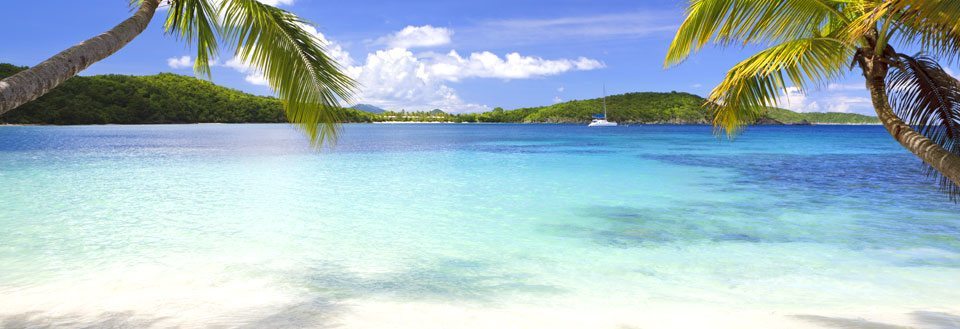The US Virgin Islands are an ideal place to go if you are keen on sun, sea, and salty water. An amazing coastline and an excellent climate attracts millions of visitors every year - all hungry for a taste of this particular paradise.�
US Virgin Islands
Charlotte Amalie
358 sq. km.
English, with some Spanish and Creole spoken.
Protestant and Catholic
117,657
The islands are a US territory, and as such are not a state proper, but are represented with one seat in the US congress. In terms of internal government, the islands have a governor and a 15-seat senate.
The US Virgin Islands are located east of Puerto Rico between the Caribbean and Atlantic Sea. The islands are part of the Lesser Antilles, but are right on the border to the Greater Antilles.
The tourist peak-season is from December to April - due to the weather in North America and Europe. The best plan is to come here out of season, when the prices of the hotel rooms are lowest. The climate in the Virgin Islands stays the same all year around.�
US dollars ($US), $1 = 100 cents.
To call for assistance in the Virgin Islands you dial 911 for police, ambulance, or fire brigade.
Tips are the order of the day in the Virgin Islands. Hotel porters usually receive a dollar per bag or suitcase. The same amount is expected by maids and tour guides. Taxi drivers get 10 per cent unless a fixed fare has been agreed upon. Restaurants expect a 10 to 15 per cent service charge.
The US Virgin Islands are 4 hours behind GMT. When it is noon in the UK, it is 8 am in the Virgin Islands.
The Virgin Islands use Imperial weights and measures: yards, miles, pounds, gallons, ounces etc.
You should never attempt to photograph the locals without asking their permission. Some will charge you a fee, while others will simply get mad at you.
It is advisable to steer clear of the tapwater and buy bottled water instead.�
120 Volts AC/60 Hz
Bare bellies and hotpants should be kept at the resorts and beaches. In urban areas it's a good idea to have a shirt and longer shorts handy. Likewise, bathing suits and bikinis must be kept to the beaches, and remember that it is against the law to go topless in the US Virgin Islands.
Banks are open from 9 am to 3 pm Monday to Friday.
Shops are open from 10 am to 6 pm Monday to Saturday.
Offices are open from 9 am to 5 pm Monday to Friday.
The most renowned local dishes are boiled or roasted goat, red bean soup, corn patties, shellfish, and johnnycakes. This is washed down with local beer and of course rum.
Generally, conditions for disabled people are rather poor in the Caribbean. Some improvements are coming in the form of lifts on cruise ships and wheelchair friendly sidewalks with ramps. For further information, contact you travel agent or the following address:
Society for the Advancement of Travel for the Handicapped
347 5th Avenue
Suite 610
New York
NY 10016
USA
Telephone: +1-212-447-7284
Fax: +1-212-725-8253
New Year's Day: January 1
Epiphany: January 6
Memorial Day: March 27
Transfer Day: March 31
Organic Act Day: June 19
Emancipation Day: July 3
US Independence Day: July 4
Hurricane Supplication Day: July 24
Columbus Day and Puerto Rican Friendship Day: October 14
Virgin Islands Thanksgiving Day (Hurricane Thanksgiving): October 17
Veterans' Day: November 11
Christmas: December 25
Boxing Day: December 26
Moveable Holidays:
Martin Luther King Day
President's Day
Easter (March or April)
Labour Day
US Thanksgiving Day
Only one of the three islands - St. John - has a couple of camping grounds.�
The islands are mostly interested in wealthy tourists, so there are few cheap hotels. But if you do have a strong travel budget, you'll find plenty of luxurious hotel rooms at your disposal
The three islands have barely two dozen guesthouses among them.
There are no youth hostels in the Virgin Islands.
Holiday apartments are a big hit in the Virgin Islands. Also, it is sometimes possible to take up board in private villas.
St. Thomas and St. Croix both have airports, but if you want to go to St. John you have to sail from one of the other islands.
By far the cheapest form of transportation in the Virgin Islands is the system of buses, which is rather good in St. Thomas and St. Croix, but a bit slower in St. John.�
There are no trains in the Virgin Islands.
All three islands have taxis. The fare is government-regulated, so you only need to negotiate with the driver about the tip. Note that the rates go up after midnight. For further information, see:
http://www.st-thomas.com/eetaxi/
The islands have plenty of car rental companies, but those vehicles that are available are also very much in demand. In the capital of Charlotte Amalie, parking can be virtually impossible. Look for more information at:
http//.www.usvi.net/stjcars.htm
The best way to get from one island to another is to take a boat or small ferry. A regular service runs between Charlotte Amalie and Red Hook on St. Thomas to St. John. In addition, there are seaplane and hydrofoil routes between St. Thomas and St. Croix.
Horse riding is popular in the Virgin Islands. You can rent a horse with or without a guide, according to your temperament and skill level. Horses are ideal for travelling into forests and mountainous regions. �
http://www.caribbeansupersite.com/usvi/index.htm
